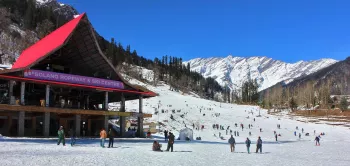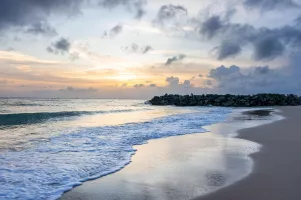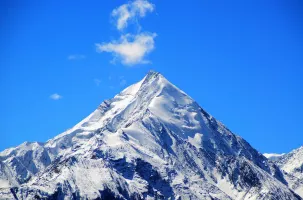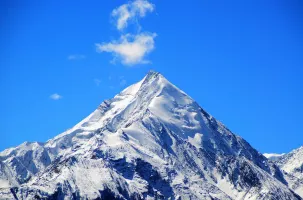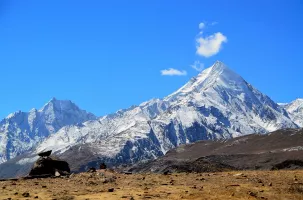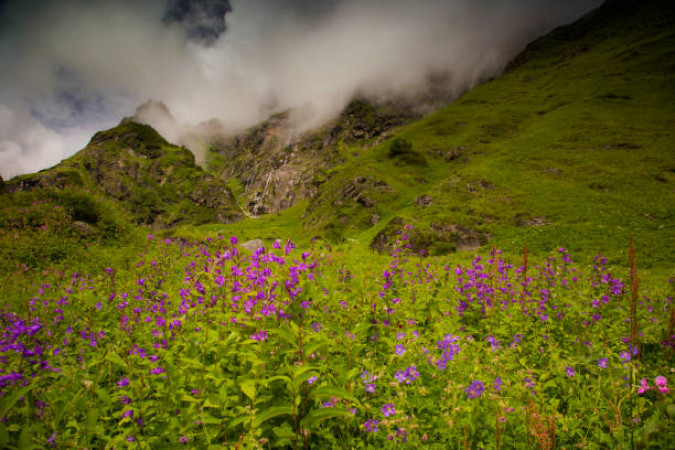
Valley of Flowers
Duration
2 to 4 Days
2 to 4 Days
Best time to visit
Jul-Aug
Jul-Aug
Theme
Hill Station, Adventure, Wildlife
Hill Station, Adventure, Wildlife
Valley of Flowers Travel Guide
Valley of Flowers is a mesmerizing national park located in the Indian state of Uttarakhand. This UNESCO World Heritage Site is renowned for its stunning meadows of endemic alpine flowers and diverse wildlife. The valley is nestled in the Western Himalayas and offers a breathtaking backdrop of snow-capped peaks. It holds cultural significance for the indigenous Bhotiya tribe and is a haven for nature lovers and trekkers.Top Attractions in Valley of Flowers
- Enchanting meadows of vibrant flowers
- Thrilling trekking trails
- Rich biodiversity with rare flora and fauna
- Breathtaking views of the Himalayan peaks
Valley of Flowers is Famous for
Its unique and unparalleled display of colorful alpine flowers in full bloom.Top Attractions in Valley of Flowers
- Exploring the Valley of Flowers National Park
- Trekking to Hemkund Sahib
- Spotting rare Himalayan wildlife like the snow leopard
- Photographing the picturesque landscapes
What's Great about Travelling to Valley of Flowers?
- Perfect for nature enthusiasts and photographers
- Offers a serene and tranquil environment
- Great for adventure seekers with trekking opportunities
What's Not So Great about Travelling to Valley of Flowers?
- Not easily accessible for travelers with mobility issues
- Limited accommodation options in the vicinity
- Weather can be unpredictable, so pack accordingly
Travel Tips for Valley of Flowers
- Obtain necessary permits for entry to the national park
- Carry sturdy trekking shoes and warm clothing
- Stay hydrated and carry snacks for the trek
Important Valley of Flowers trip information
- Ideal Duration: 3-4 days to fully explore the valley
- Best Time to Visit: July to September during the blooming season
- Nearby Airports and Railway Stations: The nearest airport is in Dehradun and the closest railway station is in Rishikesh
Top 4 Places to visit in Valley of Flowers
Per Person
15,000
*EXCLUDING APPLICABLE TAXES 5.0 Ratings
( 4 Reviews )
( 4 Reviews )
Per Person
17,000
*EXCLUDING APPLICABLE TAXES 5.0 Ratings
( 4 Reviews )
( 4 Reviews )
Per Person
18,500
*EXCLUDING APPLICABLE TAXES 5.0 Ratings
( 4 Reviews )
( 4 Reviews )
Per Person
28,000
*EXCLUDING APPLICABLE TAXES 3.7 Ratings
( 5 Reviews )
( 5 Reviews )
Per Person
17,999
*EXCLUDING APPLICABLE TAXES 5.0 Ratings
( 4 Reviews )
( 4 Reviews )
Per Person
15,500
*EXCLUDING APPLICABLE TAXES 5.0 Ratings
( 4 Reviews )
( 4 Reviews )
FAQ's on Valley of Flowers
Q1: What is the best time to visit Valley of Flowers?
The best time to visit Valley of Flowers is during the summer months of July to September when the valley is in full bloom with vibrant flowers. This period offers the most pleasant weather for trekking and exploring the valley, avoiding the monsoon rains and the harsh winter cold. Additionally, the annual Valley of Flowers National Park trek usually opens in June and closes in October, making these months ideal for visitors.
Q2: Do I need a visa to travel to Valley of Flowers?
As Valley of Flowers is located within India, travelers who hold a valid Indian visa can visit the destination without any additional requirements. However, if you are an international traveler, you will need to obtain an Indian tourist visa to enter the country and explore Valley of Flowers. Make sure to check the latest visa regulations and exceptions before planning your trip.
Q3: What are the must-visit attractions in Valley of Flowers?
Valley of Flowers is known for its stunning natural beauty and unique flora. Some must-visit attractions include the Valley of Flowers National Park, Hemkund Sahib, Badrinath Temple, and the picturesque Pushpawati River. Trekking enthusiasts can also explore nearby areas like Hemkund and Joshimath for panoramic views of the Himalayas.
Q4: Is Valley of Flowers a safe place to travel?
Valley of Flowers is generally a safe destination for travelers. However, it is essential to take precautions while trekking and exploring the remote areas. It is recommended to trek with a guide, carry essentials like water and snacks, and be aware of the weather conditions. Additionally, travelers should respect the local flora and fauna to maintain the ecological balance of the region.
Q5: What is the local currency in Valley of Flowers and can I use credit cards?
The local currency in Valley of Flowers is the Indian Rupee (INR). While credit cards may not be widely accepted in the remote areas of Valley of Flowers, it is advisable to carry sufficient cash for your expenses. There are limited ATMs in nearby towns like Joshimath and Govindghat, so it is recommended to withdraw cash before heading to the valley.
Q6: What is the local cuisine like in Valley of Flowers?
The local cuisine in Valley of Flowers offers a taste of traditional Garhwali and North Indian dishes. Some popular dishes include Rajma Chawal (kidney beans with rice), Aloo ke Gutke (spicy potatoes), and Kheer (rice pudding). Travelers can also savor local delicacies like Sidu (steamed bread) and Bhang Ki Chutney (hemp seed chutney). Vegetarian options are predominant in this region.
Q7: What transportation options are available in Valley of Flowers?
Transportation options in Valley of Flowers include buses, shared jeeps, and private taxis from nearby towns like Rishikesh, Haridwar, and Joshimath. Visitors can also opt for trekking routes to reach the valley, enjoying the scenic beauty along the way. Hiring a local guide for trekking and exploring the region is recommended for a safe and enjoyable experience.
Q8: Are there any cultural norms or etiquette I should be aware of when visiting Valley of Flowers?
When visiting Valley of Flowers, it is important to respect the local customs and traditions of the Garhwali people. Modest clothing is recommended, especially when visiting religious sites like Hemkund Sahib and Badrinath Temple. Additionally, travelers should refrain from littering and harming the natural environment. Greeting locals with a polite "Namaste" and seeking permission before clicking photographs are considered respectful gestures.
Q9: I am a travel agent. How can I buy travel leads of Valley of Flowers?
Register yourself as a travel agent at agents.tripclap.com and then you can buy travel leads to Valley of Flowers once your account is approved. For more details contact our support team at +91-8069186564 or support@tripclap.com
